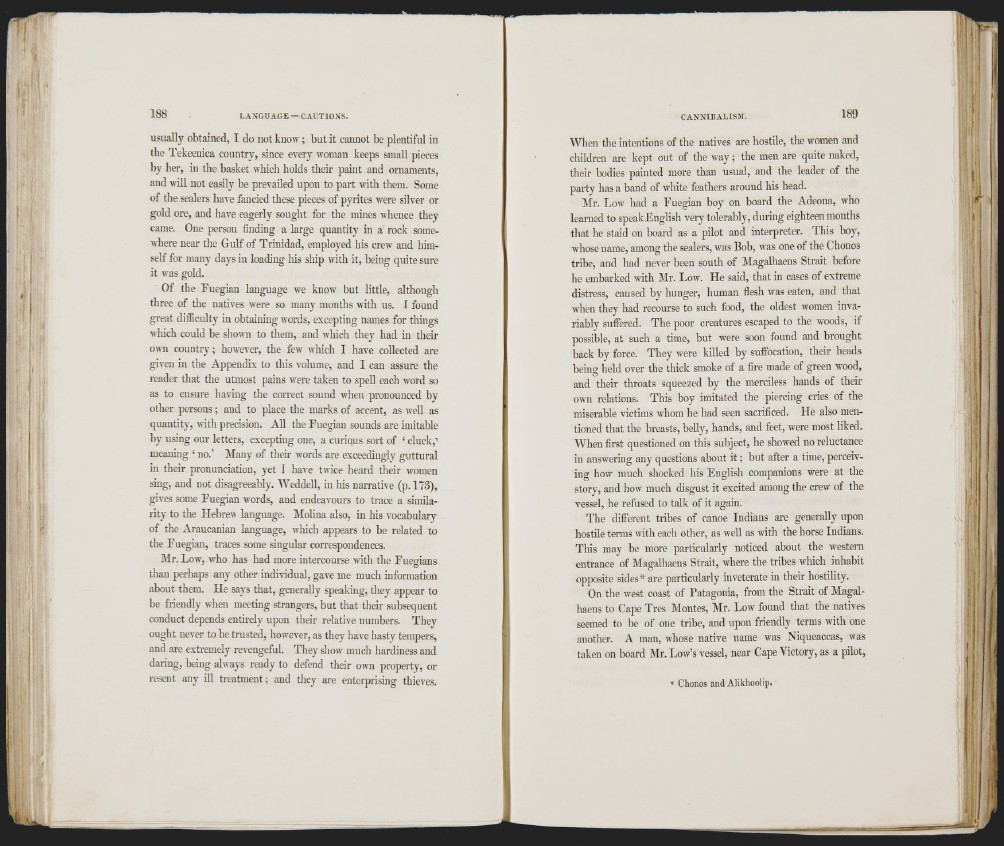
5 7'"
I
usually obtained, I do not know ; but it cannot be plentiful in
the Tekeenica country, since every woman keeps small pieces
hy her, in the basket which holds their paint and ornaments,
and will not easily be prevailed upon to part with them. Some
of the sealers have fancied these pieces of pyrites were silver or
gold ore, and have eagerly sought for the mines whence they
came. One person finding a large quantity in a rock somewhere
near the Gulf of Trinidad, employed his crew and himself
for many days in loading his ship with it, being quite sure
it was gold.
Of the Fuegian language we know but little, although
three of the natives were so many months with us. I found
great difficulty in obtaining words, excepting names for things
wliich could be shown to them, and which they had in their
own country ; however, the few which I have collected ai'e
given in the Appendix to this volume, and I can assure the
reader that the utmost pains were taken to sped each word so
as to ensure having the correct sound when pronounced by
other persons; and to place the marks of accent, as well as
quantity, with precision. All the Fuegian sounds are imitable
hy using our letters, excepting one, a curious sort of ‘ cluck,’
meaning ‘ no.’ Many of then- words are exceedingly guttural
in their pronunciation, yet I have twice heard their women
sing, and not disagreeably. AVeddell, in his narrative (p. 173),
gives some Fuegian words, and endeavours to trace a similarity
to the Hebrew language. Molina also, in his vocabulary
of the Araucanian language, which appears to be related to
the Fuegian, traces some singular correspondences.
Mr. Low, who has had more intercourse wdth the Fuegians
than perhaps any other individual, gave me much information
about them. He says that, generally speaking, they appear to
he friendly when meeting strangers, but that their subsequent
conduct depends entirely upon their relative numbers. They
ought never to be trusted, however, as they have hasty tempers,
and are extremely revengeful. They show much hardiness and
daring, being always ready to defend their oivn property, or
resent any ill treatment; and they are enterprising thieves.
When the intentions of the natives are hostile, the women and
children are kept out of the way ; the men are quite naked,
their bodies painted more than usual, and the leader of the
party has a band of white feathers around his head.
INIr. Low had a Fuegian boy on board the Adeona, who
learned to speak Fnglish very tolerably, during eighteen months
that he staid on board as a pilot and interpreter. This boy,
whose name, among the sealers, was Bob, was one of the Chonos
tribe, and had never been south of Magalhaens Strait before
he embarked with Mr. Low. He said, that in cases of extreme
distress, caused by hunger, human flesh w'as eaten, and that
when they had recourse to such food, the oldest W'omeii invariably
suffered. The poor creatures escaped to the woods, if
possible, at such a time, but were soon found and brought
hack hy force. They were killed by suffocation, their heads
being held over the thick smoke of a fire made of green wood,
and their throats squeezed by the merciless hands of their
oivn relations. This boy imitated the piercing cries of the
miserable victims whom he had seen sacrificed. He also mentioned
that the breasts, belly, hands, and feet, were most liked.
AVhen first questioned on this subject, he showed no reluctance
in answering any questions about i t ; but after a time, perceiving
how much shocked his Fnglish companions were at the
story, and how much disgust it excited among the crew of the
vessel, he refused to talk of it again.
The different tribes of canoe Indians ai-e generally upon
hostile terms with each other, as well as with the horse Indians.
This may be more particularly noticed about the western
entrance of Magalhaens Strait, where the tribes which inhabit
opposite sides* are particularly inveterate in their hostility.
On the west coast of Patagonia, from the Strait of Magalhaens
to Cape Tres Montes, Mr. Low found that the natives
seemed to be of one tribe, and upon friendly terms with one
another. A man, whose native name was Niqueaccas, was
taken on board Mr. Low’s vessel, near Cape Victory, as a pilot,
* Chonos and Alikhoolip.
4irTi
Mi):
. J l
-
1